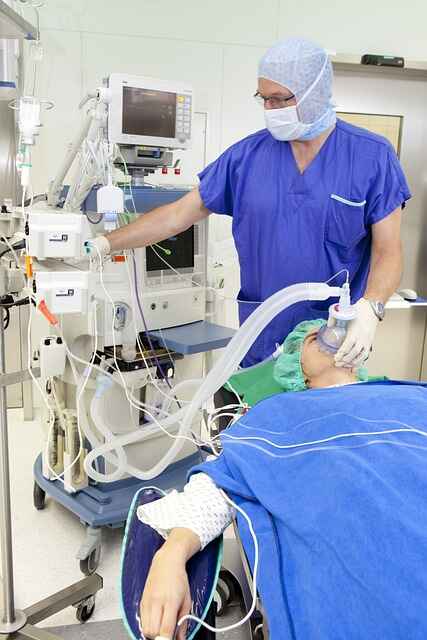What is COPD?
Chronic Obstructive Pulmonary Disease (COPD) is a chronic inflammatory disease of the lungs that causes obstruction to airflow from the lungs. People with COPD have an increased risk of developing heart disease, lung cancer, and a number of other conditions.
Emphysema and chronic bronchitis are the two most common conditions that contribute to COPD. These two conditions usually occur together and can vary in severity in individuals with COPD. Chronic bronchitis is an inflammation of the lining of the bronchi, which carries air to and from the air sacs, and alveoli of the lungs. It is characterized by daily coughing and the production of mucus.
Emphysema is a condition in which the alveoli at the end of the smallest airways of the lungs are destroyed due to harmful exposure to cigarette smoke and other irritating gases and particles.
Although COPD is a progressive disease that worsens over time, COPD is treatable. With the right treatment, most people with COPD can achieve good symptom control and quality of life. (Source)
Causes:
1. The main cause of COPD in developed countries is tobacco smoking. In the developing world, COPD often occurs in people exposed to fumes from fuel burning for cooking and heating in poorly ventilated homes. Only some chronic smokers will develop clinically overt COPD, although many smokers with a long history of smoking may experience reduced lung function.
How you kill your own lungs:
Air sacs have very thin walls filled with tiny blood vessels called capillaries. The oxygen in the air you breathe passes into these blood vessels and enters your bloodstream. At the same time, carbon dioxide is exhaled – a gas that is a waste product of metabolism.
Your lungs rely on the natural elasticity of the bronchi and air sacs to push air out of your body. COPD causes them to lose their elasticity and expand excessively, leaving some of the air trapped in the lungs when you exhale. This causes emphysema.
Emphysema: This lung disease causes the destruction of the fragile walls and elastic fibers of the alveoli. The small airways collapse during exhalation, impairing the flow of air from the lungs. In the vast majority of people with COPD, the lung damage that leads to COPD is caused by long-term cigarette smoking.
2. Alpha-1-antitrypsin deficiency
In about 1% of people with COPD, the disease is the result of a genetic disorder that causes low levels of a protein called alpha-1-antitrypsin (AAt). It is made in the liver and secreted into the bloodstream to help protect the lungs. A deficiency of alpha-1-antitrypsin can cause disease of the liver, lungs, or both.
Symptoms:
Symptoms include difficulty breathing, coughing, mucus production (sputum), and wheezing. It is usually caused by long-term exposure to irritating gases or particles, most commonly cigarette smoke.
Signs and symptoms of COPD may include:
Shortness of breath, especially during physical activities, wheezing, tightness in the chest, a chronic cough that may produce mucus that may be clear, white, yellow, or greenish, and frequent respiratory infections.
Facts:
- People with COPD are also likely to experience episodes called exacerbations, during which their symptoms worsen beyond the usual daily fluctuation and last for at least a few days.
- Cases for COPD are 67% higher in developing countries like China, India, and Mexico than the developed countries due to more industrial work and air pollution.
Treatment:
Consult your doctor if your symptoms do not improve or worsen with treatment, or if you experience signs of infection such as fever or a change in sputum. Get medical help right away if you can’t catch your breath if you experience severe blueing of the lips or nail beds, a fast heart rate, or if you feel foggy and have trouble concentrating.
Risk factors:
Risk factors for COPD include:
- Exposure to tobacco smoke. The most significant risk factor for COPD is long-term cigarette smoking. The more years you smoke and the more packs you smoke, the greater your risk. Pipe smokers, cigar smokers, and marijuana smokers may also be at risk, as well as people exposed to large amounts of secondhand smoke.
- People with asthma. Asthma, a chronic inflammatory disease of the airways, may be a risk factor for the development of COPD. The combination of asthma and smoking increases the risk of COPD even more.
- Occupational exposure to dust and chemicals. Long-term exposure to chemical fumes, fumes, and dust in the workplace can irritate and inflame your lungs.
- Exposure to fumes from fuel combustion.
- Genetics. An unusual genetic disorder, alpha-1-antitrypsin deficiency, is the cause of some cases of COPD. Other genetic factors probably make some smokers more susceptible to the disease.
Complication:
COPD can cause many complications, including:
- Respiratory tract infection. People with COPD are more likely to catch colds, flu, and pneumonia. Any respiratory infection can make breathing very difficult and could cause further damage to the lung tissue.
- Heart problems. For reasons that are not fully understood, COPD can increase the risk of heart disease, including heart attack.
- Lung cancer. People with COPD have a higher risk of developing lung cancer.
Prevention:
Preventions associated with COPD:
- Quit smoking to reduce your risk of heart disease and lung cancer.
- Get an annual flu shot and regular pneumococcal pneumonia shot to reduce or prevent some infections.
Also Read: Pleural Effusion: Symptoms, Causes, Prevention, and Treatment





